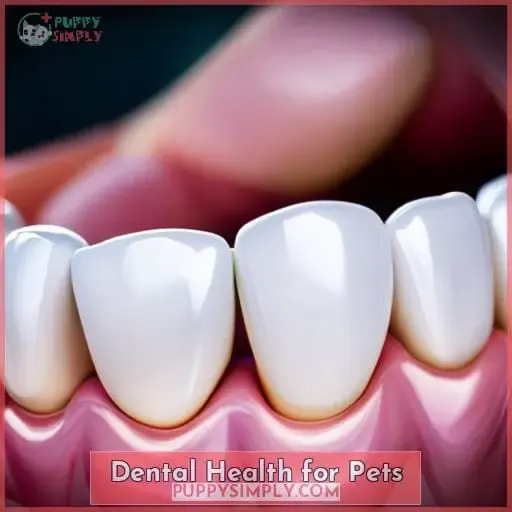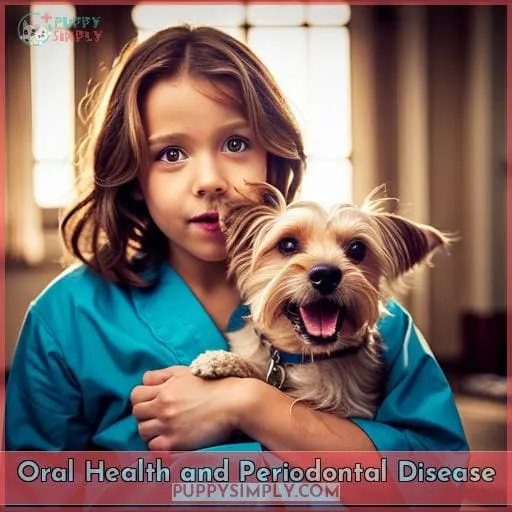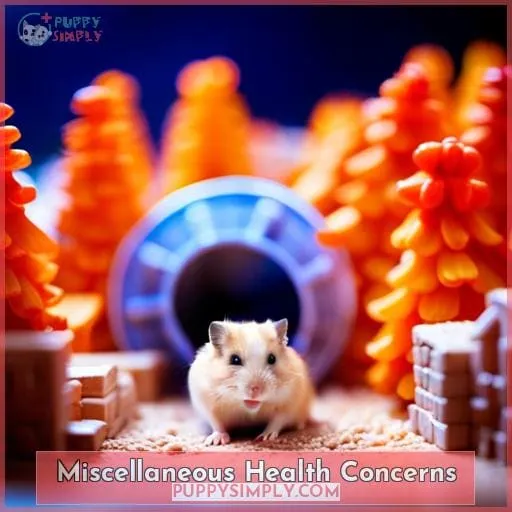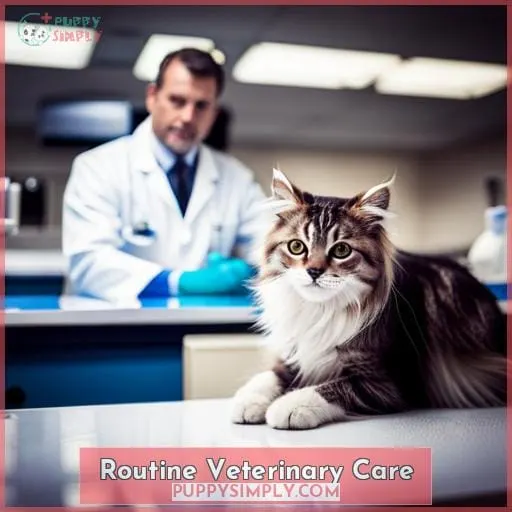This site is supported by our readers. We may earn a commission, at no cost to you, if you purchase through links.
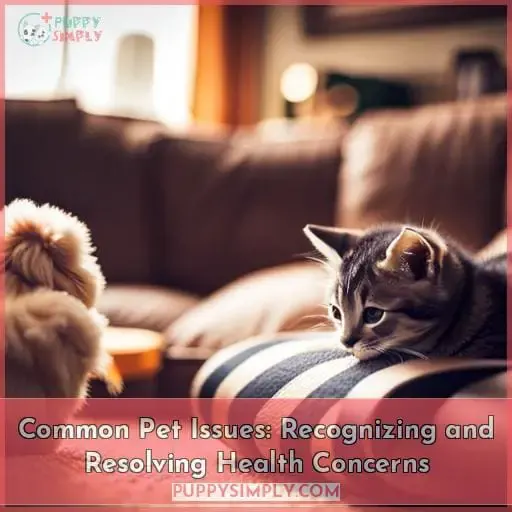 Recognizing and resolving common pet issues is a crucial part of being a responsible pet owner.
Recognizing and resolving common pet issues is a crucial part of being a responsible pet owner.
From obesity and allergies to dental health and orthopedic issues, understanding your pet’s health concerns is essential for their well-being.
This article delves into these common pet issues, providing valuable insights and practical solutions to help you keep your furry friend happy and healthy.
Table Of Contents
- Key Takeaways
- Obesity in Pets
- Allergies in Pets
- Dental Health for Pets
- Common Orthopedic Issues
- Cancer in Pets
- Gastrointestinal Concerns
- Oral Health and Periodontal Disease
- Miscellaneous Health Concerns
- At-Home Pet Care and Hospital Assistance
- Routine Veterinary Care
- Frequently Asked Questions (FAQs)
- How can I help my pet lose weight and maintain a healthy weight?
- What are some common triggers for pet allergies and how can I eliminate them?
- What are some at-home dental care routines I can follow to maintain my pet’s oral health?
- How can I prevent joint injuries and lameness in my pet?
- What are some preventive measures I can take to reduce the risk of cancer in my pet?
- Conclusion
Key Takeaways
- Obesity in pets can be caused by overeating and a lack of exercise.
- Allergies in pets can lead to vomiting, rashes, and behavioral changes.
- Regular brushing, dental checkups, and limiting sugary treats can help maintain good dental health in pets.
- Swallowing foreign objects, intestinal problems, urinary tract infections, skin disorders, and ear infections are common health concerns in pets.
Obesity in Pets
To combat pet obesity:
- First, understand its causes, which often include overeating and a lack of exercise.
- Next, consult with your veterinarian to create a diet plan tailored to your pet’s specific needs.
- Then, implement regular exercise routines to help your pet achieve and maintain a healthy weight.
Causes and Prevention
To prevent obesity in your pets:
- Monitor their food intake and ensure they get enough exercise.
- Watch out for seasonal allergies and indoor triggers that can worsen your pet’s condition.
- Manage their weight through a balanced diet and interactive toys to keep them active.
- Regular dental hygiene is also crucial in preventing obesity-related health issues.
Personalized Diet Plans
How can you create a personalized diet plan to help your obese pet reach a healthier weight?
Reach out to your animal hospital for nutritional guidance.
Dietary consultations consider:
- Your pet’s breed
- Age
- Activity level
Creating a tailored feeding plan that aids weight management and improves overall health.
Exercise Recommendations
- Follow a personalized diet plan to combat obesity in your pet.
-
Engage your pet in regular exercise:
- Design indoor activities.
- Plan outdoor adventures.
- Utilize interactive toys.
- Play mentally stimulating games.
-
Establish fitness routines that suit your pet’s:
- Age.
- Breed.
- Health condition.
- Ensure a healthy and happy lifestyle for your pet.
Allergies in Pets
You may notice your pet experiencing vomiting, rashes, or changes in behavior.
To get to the root of these symptoms, visit your veterinarian.
For a thorough check-up and testing to identify and eliminate allergy triggers, improving your pet’s overall health and well-being.
Symptoms and Triggers
Moving on to allergies in pets:
- Familiarize yourself with common symptoms and triggers that can cause your furry friend discomfort.
- Recognizing symptoms like vomiting, rashes, and behavioral changes is crucial in identifying potential allergies.
Common triggers include:
- Certain treats
- Environmental factors
- Weather changes
Understanding these triggers and implementing preventive measures can significantly improve your pet’s overall health and well-being.
Veterinary Check-ups
You should schedule veterinary check-ups for a thorough evaluation of your pet’s allergy symptoms and overall health.
Regular checkups are essential in identifying and addressing common pet health problems, including allergies.
These wellness check-ups allow veterinarians to:
- Monitor your pet’s well-being
- Provide timely interventions
- Offer proactive care to prevent future issues
By taking preventive measures through regular veterinary visits, you can ensure the optimal health and well-being of your beloved furry companion while avoiding potential emergencies down the line.
Identifying and Eliminating Allergy Triggers
To identify and eliminate allergy triggers for your pet:
- Pay close attention to their behavior and environment.
- Keep a journal of their symptoms, including any changes in their skin, eyes, ears, or breathing.
- Note down the foods they eat, the places they go, and the people they interact with.
Take them to the vet for allergy testing to identify specific triggers.
Once you know what’s causing their allergies, you can:
- Avoid those triggers.
- Keep your pet comfortable.
Dental Health for Pets
Taking care of your pet’s dental health is crucial for preventing infections and other illnesses.
You can maintain your pet’s oral health by performing at-home dental care and following your veterinarian’s instructions.
If your pet has severe dental issues, your veterinarian may recommend dental surgery or other treatments to restore their oral health.
Importance of Oral Health
Maintaining your pet’s oral health is fundamental for preventing infections and ensuring overall well-being.
Brushing techniques, dental treats, and oral hygiene tips form the foundation of preventive care.
Regular vet consultations and periodontal screenings help detect and address issues early.
Just as you value your own dental health, prioritize your pet’s oral hygiene for a healthier, happier life.
At-home Dental Care
In addition to regular checkups, you can maintain your pet’s oral health by following a proper at-home dental care routine:
- Brush your pet’s teeth regularly using a pet-specific toothpaste and toothbrush.
- Provide dental chews and toys to help remove plaque and tartar buildup.
- Monitor your pet’s diet to limit sugary treats and promote dental health.
Early detection and prevention can save your pet from discomfort and costly dental procedures.
Dental Surgery and Treatment
Your pet’s oral health may require surgical intervention or specialized treatment for optimal recovery.
- Preventive measures like regular brushing and check-ups can help avoid severe issues.
-
Post-surgery care involves:
- Pain management
- A soft diet
- Monitoring for infection
-
Long-term maintenance includes:
- Dental cleanings
- Sealants
- Extractions when necessary
Common Orthopedic Issues
Joint injuries and lameness are common orthopedic issues in pets, particularly in certain dog breeds.
If you notice your pet limping, favoring a leg, or showing signs of pain, prompt veterinary attention is crucial.
This is to diagnose and address the underlying cause, which may involve surgical intervention in some cases.
Joint Injuries
When your furry friend’s joints give them grief, tackle their joint injuries head-on with expert guidance and personalized treatment plans.
Treatment options for joint injuries include:
- Rehabilitation techniques
- Pain management strategies
- Preventive measures to minimize further damage
After an injury occurs, post-injury care is crucial for a successful recovery.
If your pet is experiencing joint issues in Northwood, NH, or surrounding areas, schedule an appointment with a veterinary professional who can provide the necessary care and support.
| Joint Injuries |
|---|
| Rehabilitation Techniques |
| Pain Management |
| Preventive Measures |
TABLE KEY:
A) Explore various rehabilitation techniques to help your pet recover from joint injuries.
B) Learn about effective pain management strategies that alleviate discomfort caused by these injuries.
C) Discover preventive measures that can be taken to reduce the risk of future joint problems in pets.
Lameness
You might notice a change in your pet’s gait, indicating a potential orthopedic issue known as lameness.
Prompt veterinary attention is crucial for an accurate diagnosis.
X-rays, CT scans, and MRI may be utilized to pinpoint the underlying cause.
Rehabilitation techniques, physical therapy options, and assistive devices can aid in recovery.
Pain management strategies ensure your pet’s comfort throughout the healing process.
Early intervention is key to restoring your pet’s mobility and overall well-being.
Surgical Options
Opting for surgical intervention when faced with severe orthopedic issues in your pet can lead to restored mobility and pain relief.
Exploring surgical advances, you can trust in minimally invasive techniques that reduce recovery time and discomfort.
Post-op care involves pain management, physical therapy, and diligent monitoring.
Anesthetic safety protocols ensure your pet’s well-being throughout the procedure.
Follow-up appointments are crucial to track progress and ensure a smooth recovery.
Cancer in Pets
You may already be acquainted with radiation or chemotherapy treatments for cancer in pets.
Did you know that some dog breeds, like German shepherds and Labrador retrievers, are more susceptible to cancer than others?
Let’s learn more about this common pet issue.
Types of Cancer
You’ll find various types of cancer in pets, including lymphoma, osteosarcoma, and mast cell tumors.
Understanding treatments is vital, as radiation and chemotherapy offer hope.
Certain breeds, like German shepherds, Labrador retrievers, and Great Danes, face higher risks.
Early detection and prompt treatment enhance your pet’s chances of a positive outcome.
Radiation and Chemotherapy Treatments
- Some pets can undergo radiation and chemotherapy just like humans to fight cancer.
Explore radiation and chemotherapy options with your veterinarian, considering potential risks and side effects.
Palliative care may provide comfort, and supportive therapies can minimize discomfort.
Alternative treatments might be available, so discuss all options to make informed decisions for your beloved pet’s well-being.
Breeds Prone to Cancer
Certain dog breeds like German shepherds, Labrador retrievers, and Great Danes are more susceptible to cancer, so watch out for any unusual signs or symptoms.
Genetic Predisposition:
- Specific breeds inherit a higher risk of developing certain cancers due to genetic factors.
Early Detection:
- Regular check-ups and screenings are crucial for early detection and prompt treatment.
Lifestyle and Diet:
- Provide a healthy diet and encourage regular exercise to support a strong immune system.
Responsible Breeding:
- Encourage responsible breeding practices that prioritize genetic diversity and health testing.
Gastrointestinal Concerns
When it comes to gastrointestinal concerns in pets, there are a few common issues to be aware of:
- Swallowing foreign objects can pose serious harm and often require professional medical help.
- Intestinal problems can indicate various underlying issues in dogs and cats.
Swallowing Foreign Objects
Swallowing foreign objects, a common gastrointestinal concern in pets, can lead to serious health risks.
You can prevent such incidents by:
- Pet-proofing your home
- Supervising your pet during playtime
If your pet swallows something dangerous, act quickly.
- Call your veterinarian or the nearest animal hospital for first aid instructions.
Knowing common swallowing hazards and training your pet to avoid them can also minimize risks.
Intestinal Problems
In dogs, stomach and intestinal disorders signal a range of issues requiring prompt attention.
Be vigilant for changes in appetite, vomiting, diarrhea, or constipation.
Dietary adjustments and parasite management can alleviate many issues.
Behavioral changes and stress can also upset their gut microbiome.
Digestive health is paramount for your furry friend’s well-being, so seek veterinary guidance for optimal care.
Professional Medical Help
If you suspect your pet has swallowed an object or is experiencing intestinal problems, seek professional medical help immediately.
Emergency procedures and urgent care are available at veterinary clinics 24/7.
Critical conditions require immediate medical attention, so don’t hesitate to call your vet or rush your pet to the nearest animal hospital.
Veterinary services are equipped to handle medical emergencies and provide the necessary treatment to alleviate your pet’s suffering.
Oral Health and Periodontal Disease
Periodontal disease is a common and serious issue in pets, leading to pain, tooth loss, and other health problems.
You can help prevent it by:
- Brushing your pet’s teeth regularly
- Providing them with dental chews
If you notice signs of periodontal disease, such as:
- Bad breath
- Loose teeth
- Bleeding gums
Take your pet to the vet right away.
Preventing Periodontal Disease
Alongside regular dental care, brushing your pet’s teeth daily staves off periodontal disease, ensuring their optimal oral health.
Plaque buildup, a breeding ground for bacteria that causes gum disease and tooth decay, is effectively prevented with daily brushing.
Implement a dental hygiene routine that includes tartar control toothpaste, designed to combat plaque and freshen breath.
Prioritizing oral health safeguards your pet from gingivitis, a precursor to periodontal disease, preserving their overall well-being.
Signs and Symptoms
Since you’re now aware of the potential causes and preventive measures for periodontal disease, let’s delve into its noticeable signs and symptoms.
- Bad Breath: A persistent foul odor from your pet’s mouth is a common symptom.
- Inflamed Gums: Look for redness, swelling, and bleeding gums.
- Loose or Shaking Teeth: If your pet’s teeth appear loose or move excessively, it’s a sign of advanced disease.
- Behavioral Changes: Noticeable changes in eating habits, chewing patterns, or reluctance to play with chew toys can indicate oral discomfort.
Importance of Regular Dental Care
Regular dental care is essential for preventing gum disease and tooth decay in your pet’s mouth.
Preventive techniques like brushing their teeth, providing dental chews, and scheduling professional cleanings can save you and your pet from periodontal pain and costly treatments.
Maintaining good oral hygiene is crucial for your pet’s overall health and well-being.
Don’t let dental neglect compromise your pet’s periodontal health and quality of life.
Miscellaneous Health Concerns
You’ve noticed your pet having trouble urinating, scratching incessantly, or shaking their head a lot.
These signs can indicate:
- Urinary tract infections
- Skin disorders
- Ear infections
It’s important to recognize these common pet issues and seek veterinary attention promptly to ensure your pet’s health and well-being.
Urinary Tract Infections
You can also contract urinary tract infections, which present a wide range of urological problems in pets.
Recognize the behavioral changes that may signal discomfort, such as:
- Frequent urination
- Straining
- Accidents
Prevention tips include:
- Ensuring clean litter boxes
- Providing ample water
- Maintaining a healthy diet
Treatment options vary, so prompt veterinary care is crucial. Recurrence risks can be minimized with proper medication and environmental modifications.
Skin Disorders
With over 160 skin disorders possible in dogs, recognizing how these conditions can indicate internal health issues is crucial.
Common culprits include:
- Environmental factors
- Food allergies
- Underlying health conditions
Diagnostic techniques like skin scrapings and biopsies help pinpoint the cause, informing treatment options.
While some disorders are breed-specific, all dogs can benefit from holistic approaches like:
- A well-balanced diet
- Regular exercise
- Stress reduction
Ear Infections
Watch out for ear infections, more common in dogs due to harmful bacteria, excessive hair, and moisture.
Canine companions with floppy ears are especially prone.
Recognizing signs like head shaking, scratching, or a foul odor is crucial.
Seek veterinary care for treatment methods like antibiotics or ear cleaning.
Preventive measures include regular ear cleaning and avoiding moisture buildup.
Recurring infections may indicate underlying health issues.
Seasonal influences, like allergies, can also play a role.
Consider holistic approaches like herbal remedies or dietary changes for long-term relief.
At-Home Pet Care and Hospital Assistance
Educate yourself about common pet issues.
This will aid your pet’s recovery at home.
Performing at-home remedies helps maintain your pet’s health between regular check-ups.
Knowledge of proper care and nutrition enhances your pet’s comfort and well-being.
Performing At-Home Remedies
To maintain your pet’s health between regular checkups:
- Educate yourself about common pet health issues.
- Perform simple at-home remedies.
First aid techniques for minor injuries can prevent infections.
Herbal remedies like chamomile tea can soothe digestive issues.
Behavioral training corrects unwanted behaviors like excessive barking.
Alternative therapies like acupuncture can alleviate pain and improve overall well-being.
Emergency preparedness involves:
- Creating a pet first aid kit.
- Knowing CPR.
Proper Care and Nutrition
Your pet’s comfort and well-being can be enhanced through knowledge of proper care and nutrition.
Ensure a balanced diet that fulfills their nutrient requirements.
Establish consistent feeding schedules to prevent overeating and obesity.
Consult your veterinarian about dietary supplements if needed.
Practice portion control to maintain a healthy weight.
Understanding your pet’s specific needs is key to their optimal health.
Role of Veterinary Hospitals
For comprehensive pet care and assistance with at-home remedies, rely on knowledgeable veterinarians.
They’re equipped with veterinary innovations and holistic approaches to ensure your pet’s well-being.
In emergencies, they provide immediate care, and telemedicine’s impact allows remote consultations.
Community outreach programs offer affordable services, and their expertise helps you prepare for emergencies.
Trust veterinary hospitals as your partners in pet healthcare.
Routine Veterinary Care
Routine veterinary care ensures your pet’s optimal health through regular checkups, preventive measures, and prompt treatment of ailments. It’s not just about treating illnesses; it’s about preventing them before they start.
Preventive Wellness:
- Regular checkups allow your veterinarian to assess your pet’s overall health, detect potential problems early, and recommend preventive measures like vaccinations and parasite control.
Checkup Benefits:
- Early detection of health issues can significantly improve treatment outcomes and reduce the risk of serious complications.
- Routine checkups also provide an opportunity to discuss any concerns you have about your pet’s behavior or well-being.
Well-being Maintenance:
- Comprehensive pet care routines, including regular checkups and preventive measures, contribute to your pet’s long-term well-being and happiness.
- A healthy pet is a happy pet.
Frequently Asked Questions (FAQs)
How can I help my pet lose weight and maintain a healthy weight?
Consult your veterinarian for a personalized diet plan, exercise routine, and tips to help your furry friend:
- Shed excess weight
- Achieve a healthier lifestyle
What are some common triggers for pet allergies and how can I eliminate them?
Uncover the hidden culprits behind your pet’s allergies:
- Dust mites lurking in carpets
- Pollen clinging to curtains
- Food sensitivities causing discomfort
Take action to eliminate these triggers, creating a haven of comfort for your beloved companion.
What are some at-home dental care routines I can follow to maintain my pet’s oral health?
Regular brushing with pet-safe toothpaste,
Providing dental chews,
And scheduling routine dental checkups
Are key to maintaining your pet’s oral health
And preventing painful and costly dental issues.
How can I prevent joint injuries and lameness in my pet?
Prevent joint injuries and lameness by making your pet’s world a padded paradise.
Soft surfaces, ramps, and comfy beds will make them feel like they’re walking on clouds.
What are some preventive measures I can take to reduce the risk of cancer in my pet?
To lower cancer risks:
- Feed a healthy diet.
- Maintain a lean weight.
- Avoid smoking near pets.
- Vaccinate against preventable cancers.
Regular checkups aid early detection.
Conclusion
Imagine your pet as a precious jewel in your life.
Their well-being is paramount.
Recognizing common pet issues is akin to safeguarding their sparkle.
Like a skilled jeweler examines a gem for imperfections, you must vigilantly monitor your pet’s health, addressing concerns with personalized care.
With knowledge and compassion, you can ensure your furry friend remains a radiant gem, shining brightly in your life together.



